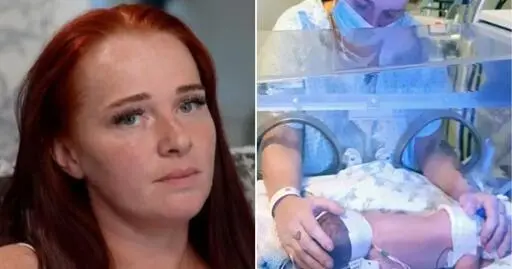Mum's agony at finding son's body 'in baby bouncer' at funeral director's home
Mum's agony at finding son's body 'in baby bouncer' at funeral director's home

Mum's agony at finding son's body 'in baby bouncer' at funeral director's home

A funeral director who took babies’ bodies home with her has been banned from maternity wards and morgues in Leeds.
Amie Upton, 38, placed one deceased infant in a baby bouncer in front of her TV so he could ‘watch cartoons’, according to one traumatised mum.
Zoe Ward, 32, said the sight of her son, Bleu, who was just three weeks old when he died of brain damage in 2021, propped up at Ms Upton’s home was ‘terrifying’.
Another couple who learned their stillborn daughter’s body had been taken home by Ms Upton said: ‘It was just crazy. If I told somebody of this story… they’d think it was a horror film.’
Leeds Teaching Hospitals Trust banned Ms Upton from all its mortuaries and maternity wards earlier this year, a BBC investigation revealed.
Zoe said she contacted Ms Upton’s baby loss support and funeral service, Florrie’s Army, to arrange Bleu’s funeral.
Florrie’s Army says it supports bereaved parents and offers free handprints, photographs, baby clothing and a dedicated funeral service.
Speaking to the BBC, Zoe described speaking with Ms Upton and coming away confident that the service would be ‘brilliant’.
But when it came to meeting face to face, she said she was ‘terrified’ to find him positioned in front of the television in Ms Upton’s living room.
‘She [Ms Upton] says: “Come in, we’re watching PJ Masks”,’ Zoe said.
‘There was another [dead] baby on the sofa. It wasn’t a nice sight.’
She said she called her own mum ‘screaming’ before another funeral director was asked to come and collect Bleu’s body.
Zoe said the ‘weird’ experience made her ‘upset and angry’.
The funeral industry in England and Wales is unregulated, with no legal requirements on how bodies should be stored or qualifications required to become a funeral director.
Earlier this year, an inquiry urged the government to introduce statutory regulations to protect the ‘security and dignity’ of people after death.